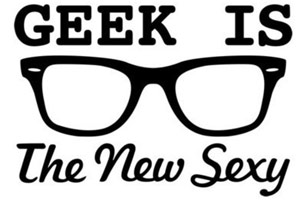What can geeks do for you

When people think of you, they likely associate you with a few things for which you're best known or best at doing: everyone knows somebody who opts to fix their car in the driveway instead of bringing it to a shop or a handyman neighbour who built his own shed.
I've recently become aware of geekiness in my own life. As a cycling enthusiast, I often pore over websites for hours at a time looking at new products, interviews and training instructions. While looking at the dimensions of a new bicycle frame, I noticed in the description that it was made from 6061 Aluminum Alloy. Being a curious kind of person, it only took 25 minutes before I was looking at the Periodic Table of Elements, trying to understand atomic mass, covalent bonds and everything else I worked so hard to not learn in high school. My inner geek had surfaced, eager to fill everybody in on the advantages and drawbacks of additional tensile strength that can be achieved in the 4130 alloy.
Julien Channer is a second-year student in the Computer Systems Technology program here at Fanshawe, and he spent his summer working as a computer technician for the Fanshawe Student Union.
Channer's journey into geekdom can be tracked to his first computer. "My parents got one in '95 when I was 10, that was sort of the beginning, I guess." He remembered his first forays into working with software. "All I was concerned about right away was figuring out how to get whatever games I wanted to work. Whenever it would break, we'd have a guy who would come over." Even 'that guy' now remembers who 'that guy' was back in the day.
In Channer's words, "Given enough time and given enough boredom, I would just start messing around with computer settings. That's the best way to figure out how stuff works." Anyone can start messing around with settings, but it's the drive to mess with all the settings that defines a geek. As much business as local bicycle shops get repairing broken parts, I've seen triple the amount of work done free of charge by untrained cycling enthusiasts who don't leave the house without a bag of tools.
Alison McGee is a Fanshawe Film graduate from 2011 and resident film critic for The Interrobang. She had no problem admitting that she has a lot of geek in her: "I would say it's a very fair statement to call me a film geek — in fact, I'm proud to call myself that!" She's "learned how to think critically about aspects of film like cinematography, editing and atmosphere," thanks to two years of studying film. Even a geek needs their tools, and in Alison's case, she got those by studying Film at Fanshawe, but her interest in her field was what drove her to equip herself in the first place.
We love geeks. Having a friend change your oil in 45 minutes for a 12-pack of beer feels infinitely preferable to dropping a vehicle off for six hours with a good chance you'll get a call that it won't be ready until tomorrow. Every coin has two sides, however, and I decided to get some insight into what it's like being on the other side of the arrangement.
Channer deals with computers for himself and his girlfriend, his parents, her parents and a host of others who caught wind of free repairs. "It's really useful sometimes if you want to impress somebody," but these favours can eventually become obligations, he said, and that can lead to some awkward situations.
McGee has had a significantly different experience. "I actually don't get asked for my opinion on movies all that much from friends and family, I think because I am very open about my opinions with people that I know — they don't want me to spend 10 minutes telling them why a movie they really want to see is terrible. My husband just avoids that area with me altogether." A sure sign of geekdom is when your partner starts intentionally avoiding the subject area because they don't want to risk setting you off!
Channer and McGee have taken their hobbies to the next level and use their skills to earn some extra money, though Channer experienced some complications. "It's always a family network or a friend network — you feel like an ass if you charge your friend to fix his laptop and it takes an hour, but if his friend is like, 'Hey, he fixed your laptop, can he fix mine?' do you charge him?" The price he charges is always a fraction of what you'd pay in store, and in return, you get a personal guarantee instead of one based on store policy. The inherent dilemmas that arise from charging for non-certified expertise are plentiful, but in most cases this too is an advantage. At a computer repair store you'll be charged as soon as you hand over your PC, while a friend can play with it for five minutes and save you the diagnostic fee at the very least. An individual working for himself can determine what price is appropriate based on the amount of labour necessary. At a place like Future Shop, there's a set price for every procedure and labour is added on top of that.
Geeks get things done, simply being a geek means you are well informed on the subject, actively involved in the community and, by and large, you just know what you're doing. Embracing your inner geek will result in personal enjoyment of a new — or old — hobby, new friends and a feeling of satisfaction that comes from being 'that guy.' While it was a long time coming, I think the day is almost upon us when the geek will inherit the earth.













